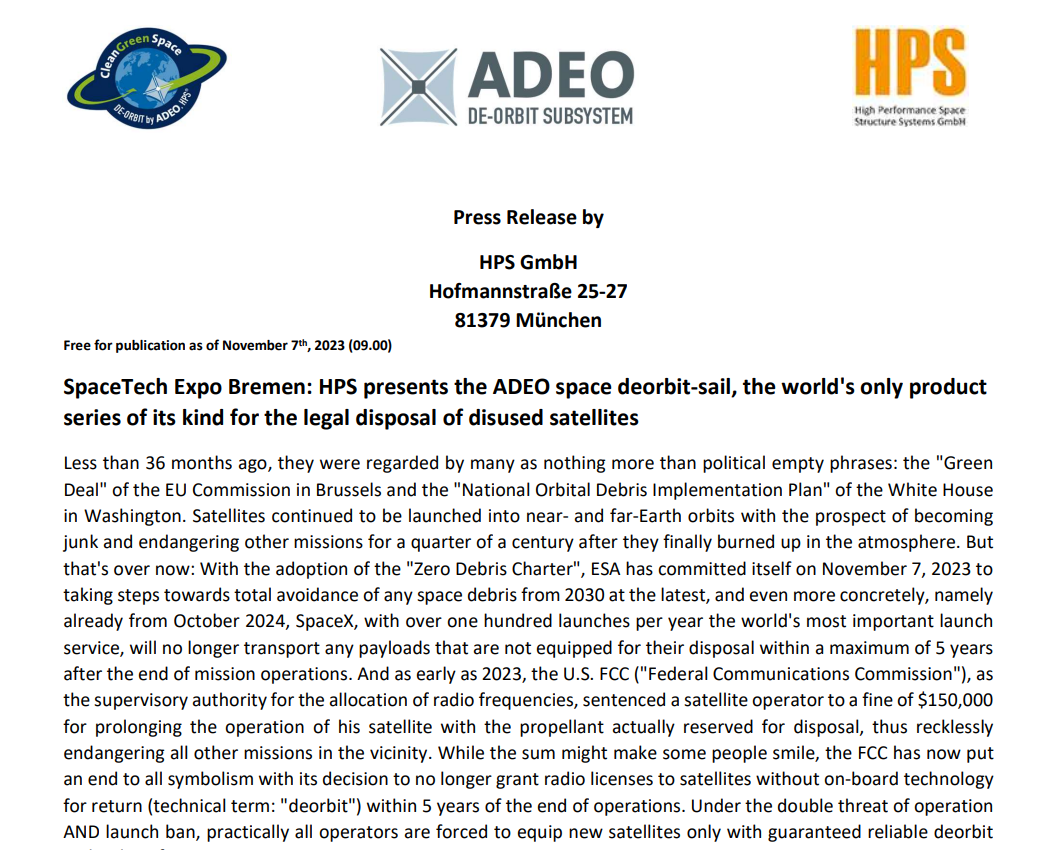November 2023
HPS presents ADEO space deorbit-sail, the world’s only product series of its kind for the legal disposal of disused satellites
SpaceTech Expo Bremen: HPS presents the ADEO space deorbit-sail, the world’s only product series of its kind for the legal disposal of disused satellites
Less than 36 months ago, they were regarded by many as nothing more than political empty phrases: the “Green Deal” of the EU Commission in Brussels and the “National Orbital Debris Implementation Plan” of the White House in Washington. Satellites continued to be launched into near- and far-Earth orbits with the prospect of becoming junk and endangering other missions for a quarter of a century after they finally burned up in the atmosphere. But that’s over now: With the adoption of the “Zero Debris Charter”, ESA has committed itself on November 7, 2023 to taking steps towards total avoidance of any space debris from 2030 at the latest, and even more concretely, namely already from October 2024, SpaceX, with over one hundred launches per year the world’s most important launch service, will no longer transport any payloads that are not equipped for their disposal within a maximum of 5 years after the end of mission operations. And as early as 2023, the U.S. FCC (“Federal Communications Commission”), as the supervisory authority for the allocation of radio frequencies, sentenced a satellite operator to a fine of $150,000 for prolonging the operation of his satellite with the propellant actually reserved for disposal, thus recklessly endangering all other missions in the vicinity. While the sum might make some people smile, the FCC has now put an end to all symbolism with its decision to no longer grant radio licenses to satellites without on-board technology for return (technical term: “deorbit”) within 5 years of the end of operations. Under the double threat of operation AND launch ban, practically all operators are forced to equip new satellites only with guaranteed reliable deorbit technology from now on.
This can be done with the on-board propulsion system using chemical propellants while shortening mission and profit, but even that does not work in case of satellite failure and is also comparatively expensive due to the need for constant control monitoring from the ground.
The alternative is called ADEO: from HPS (Munich and Bukarest) a space sail, self-deploying at the end of the mission, which automatically removes the satellite from space well below the specified deorbit times, is ideally suited as baseline-tech and emergency parachute. Already 36 million flight kilometers before the planned maneuver, the German specialist for orbit guidance and collision avoidance OKAPI:Orbits (Braunschweig) as a cooperation partner calculates the point for the descent without risk for other satellites. In addition, HPS partner number two, the Italian company AVIOSONIC, in constant liaison with the worldwide air traffic control stations, ensures via new ADEO-features highly accurate position conrol and spares aircrafts from hits by any satellite parts that may not have burned up.
The ADEO product family with officially attributed highest possible level of reliability (“TRL 9”) holds tailor-made solutions for all satellites from the tiny Pico- and Cube-Sat up to the 1.5 tonner and for all low-Earth orbits up to a distance of 900 kilometers from Earth. All ADEO lines are mass-produced by HPS, yet they feature adaptive design for special requirements that may arise from satellite design.
The prices of all ADEO models without exception are considerably lower than the expenditures required for deorbiting with chemically driven engines – apart from the fact that the safety of the deorbit of even these satellites – for example in the event of a system failure – can actually only be guaranteed by an ADEO system carried along as a backup.
For more detailed information on ADEO see: https://www.hps-gmbh.com/en/portfolio/adeo-angel-on-wings/

